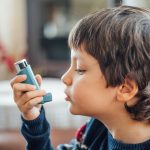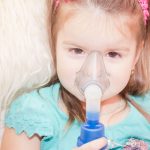Table of Contents
Can a Humidifier Help With Bronchitis Symptoms?
 Yes, using a humidifier can provide some relief for certain bronchitis symptoms by adding moisture to the air and making breathing a little easier.
Yes, using a humidifier can provide some relief for certain bronchitis symptoms by adding moisture to the air and making breathing a little easier.
The inflammation and irritation associated with bronchitis often leads to thick, sticky mucus that can be difficult to expel from the lungs. The dry air commonly found in most homes during colder months can make this mucus even thicker and harder to clear.
By adding humidity back into the air, a humidifier can help thin out the mucus secretions, loosen chest congestion, and soothe irritated airways, allowing for easier breathing and coughing.
According to the American Lung Association, proper air moisture levels can help keep the bronchial tubes lubricated and make it easier to clear mucus buildup. The moisture provided by a humidifier essentially reconstitutes dried mucus, turning it from a sticky gel back into a thinner liquid that is less likely to clog the airways.
While a humidifier cannot cure bronchitis or address the underlying inflammation, it can be a useful add-on therapy to help temporarily alleviate some of the frustrating symptoms.
Easing Bronchitis with a Humidifier: A Breath of Fresh Air?
Have you ever felt the discomfort of bronchitis, where each breath feels like breathing through a narrow straw? It’s not just you; many share this struggle, especially in the biting cold of winter months. But here’s a ray of hope: a simple device like a humidifier might just be the unsung hero in your battle against bronchitis symptoms.
The Struggle is Real: Bronchitis and its Sticky Foes
Imagine your bronchial tubes as highways for air in and out of your lungs, now clogged with thick, sticky mucus. This mucus is like the traffic jam from your worst nightmare, especially when the air is as dry as a desert. That’s where the humidifier steps in, adding moisture to the air, much like rain clears up those highway jams, making the mucus less clingy and easier to clear.
Picture this: a cozy room, the air filled with a gentle mist from your humidifier, making each breath smoother, lessening the cough that’s been keeping you up at night. It’s not magic, but it’s close; the American Lung Association backs this up, noting how the right moisture levels can make those bronchial tubes less like a battleground.
Bronchitis 101: The What and The Why
Bronchitis turns your airways into irritated, inflamed channels, making you cough up what feels like your body weight in mucus. It comes in two main flavors: acute, which is like a terrible guest that leaves after a few weeks, and chronic, a more unwelcome tenant that refuses to leave, often thanks to irritants like smoke or pollution.
 Humidifiers to the Rescue: How Do They Help?
Humidifiers to the Rescue: How Do They Help?
So, how does a humidifier fit into this picture? It’s all about the air. Dry air makes mucus thick and sticky, but with a humidifier, that mucus becomes thinner, less sticky, and easier to cough up. It’s like the difference between trying to spread cold butter on toast versus melted butter; one is a struggle, the other, effortless.
Picking the Right Humidifier: Your Bronchitis Ally
When choosing a humidifier, think of it as choosing a teammate: you want the right fit. Cool mist humidifiers are often the MVP here, reducing the risk of burns and avoiding the bacteria playground that warm mist humidifiers can become. Look for one with adjustable settings to keep your room at that ideal 30-50% humidity sweet spot.
Types of Humidifiers and Their Features
| Humidifier Type | Pros | Cons |
|---|---|---|
| Warm Mist |
|
|
| Cool Mist |
|
|
| Ultrasonic |
|
|
Humidifier 101: Tips for Optimal Relief
To make the most of your humidifier, treat it well. Keep it clean to avoid turning it into a petri dish for bacteria. And remember, too much of a good thing (humidity, in this case) can lead to issues like mold, so keep an eye on those levels.
Symptom Relief Comparison
| Bronchitis Symptom | How a Humidifier Helps |
|---|---|
| Coughing | Adds moisture to the air, reducing throat irritation and helping to loosen mucus, making it easier to cough up. |
| Thickened Mucus | Increases air humidity, which thins the mucus, making it less sticky and easier to expel. |
| Wheezing and Breathlessness | Moist air can soothe irritated airways, reducing inflammation and allowing for easier air flow. |
| Chest Tightness | Eases congestion by loosening mucus, reducing the feeling of tightness and discomfort in the chest. |
Beyond the Humidifier: A Holistic Approach to Bronchitis Relief
While a humidifier can be a game-changer, don’t forget other players in your bronchitis relief team: staying hydrated, using over-the-counter meds wisely, and avoiding irritants. Together, they can help you breathe easier and feel better.
Navigating the Mist: Your Humidifier and Bronchitis Guide
Embarking on a journey with a humidifier to alleviate bronchitis can raise some questions. Here’s a compass to guide you through the fog, with answers to some common curiosities:
1. Can a humidifier really make breathing easier during a bronchitis flare-up?
Absolutely! By infusing the air with moisture, a humidifier can thin out the mucus, making it less sticky and easier to cough up, thus easing your breathing.
2. Is there a specific type of humidifier that’s best for bronchitis?
While several types exist, cool mist humidifiers are often recommended for their safety and efficiency, especially in preventing the growth of mold and bacteria.
3. How do I know if my humidifier is helping with my bronchitis symptoms?
You might notice easier breathing, reduced cough severity, and more comfortable sleep. If your symptoms don’t improve, it might be time to check the humidity level and ensure the device is working correctly.
4. What’s the ideal humidity level to aim for?
Keeping indoor humidity between 30-50% is key. This range helps alleviate symptoms without promoting mold and dust mite growth.
5. How often should I clean my humidifier to keep it safe?
Daily emptying and drying, with thorough cleaning at least once a week, can prevent harmful microbial growth, keeping your air safe to breathe.
6. Can using a humidifier replace other bronchitis treatments?
While a humidifier can ease symptoms, it’s not a standalone treatment. It’s best used alongside other remedies and medical advice for comprehensive care.
7. Are there any risks to using a humidifier for bronchitis?
If not maintained properly, humidifiers can harbor bacteria and mold, potentially worsening respiratory issues. Always follow cleaning guidelines and use distilled or demineralized water when possible.
8. How close should the humidifier be to my bed for maximum benefit?
Placing the humidifier within 3-5 feet of your bed allows you to breathe in the moist air directly, offering relief especially at night.
9. Can I use essential oils in my humidifier to help with bronchitis?
It depends on the type of humidifier. While some are designed for use with essential oils, others can be damaged by them. Check your manufacturer’s recommendations first.
10. What should I do if I don’t notice any improvement in my bronchitis symptoms with a humidifier?
If symptoms persist or worsen, it’s crucial to consult a healthcare professional. They can provide personalized advice and treatment options tailored to your needs.
Let this guide be your beacon, helping you navigate the use of a humidifier for bronchitis relief with confidence and clarity.




 Humidifiers to the Rescue: How Do They Help?
Humidifiers to the Rescue: How Do They Help?




